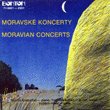|
|

Kratochvíl / Ackerman / Havel Following his free-jazz beginnings in the late sixties and the jazz-rock period he helped to define in the seventies, keyboardist Martin Kratochvíl created a comfortable musical existence for himself in the eighties. But while he periodically punctuated his successful film-scoring career with computer-controlled electronic music performances, he was searching for a new direction. The answer came to him in the form of guitarist Tony Ackerman. Born in Europe, educated in the States, Tony finally settled in Prague as a music teacher at the American University. The two met briefly in 1977 during Martin's studies at Berklee College of Music in Boston, and they celebrated a reunion with their first release Old Acquaintance (Bonton, 1986). The two of them also became very impressed by the young, classically trained cellist Vojtech Havel during the recording of Ornament (Panton 1988). When they decided to tour the country in the nineties, they invited Havel for his post-modern, minimalist style of play. The resulting live recording Moravian Concerts as well as the studio produced Chiaroscuro, perfectly capture this unique combination of backgrounds and styles. The opening medley Ornament/Now You See It, Now You Don't consists mostly of twirling, cascading figures alternating between the piano and guitar, with cello playing largely a supporting role. The musicians trade melodies and rhythmic accompaniments à la George Shearing and Jim Hall, until a total breakdown, just before the theme returns. River's Invitation/Chicago Blues is introduced by Tony in charming Czech, but he sings both songs with an infectious folksy enthusiasm in English. Sumperské prekvapení (Sumperk Surprise) opens with slow, atmospheric guitar and cello sounds that lead into a driving 5/4 rhythm. Then the return of the opening, and a new slower B theme in a blues form eventually end the song. Kratochvíl's Kalypso is marked by a persistent ostinato figure most of the time tended by the cello. During his extensive solo however, Havel comes up with sounds reminiscent of such diverse instruments as didjeridu and bagpipes. Then Lucní harfa (Meadow Harp) - his forgettable new-age piano & cello interlude - leads into Tony's vocals on Somebody Stole My Gal. It features Kratochvil's remarkable honky tonk piano playing. Finally, Toledo brings it all together: Ackerman's folk/blues tradition and Kratochvíl's jazz/rock feel. However a natural question comes to mind, now that the decade is coming to a close: Where will Kratochvíl lead us in the next ten year? "Czech" back in the new millennium! Copyright © 1998 Ivan Sever
|
| © 2011 Luna Kafé |